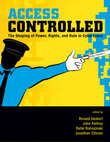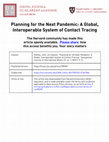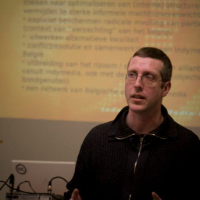Whitepapers & Reports by John Palfrey
Berkman Center Research Publication No. 2010-5 , Harvard Public Law Working Paper No. 10-29 , Apr 12, 2010
... 5.3 Age ..... ... solicitation by revealing personal information, usually to marketers or on ... more ... 5.3 Age ..... ... solicitation by revealing personal information, usually to marketers or on social networking sites (Aidman ... First, commercial websites and advertising networks are said to manipulate children into ...
Papers by John Palfrey
The use of the term "digital natives" has led to a great deal of controversy. Most academics disl... more The use of the term "digital natives" has led to a great deal of controversy. Most academics dislike it, for good and sufficient reasons. Among other problems, the term implies that digital skills are innate rather than taught and learned. But the term resonates for many parents, teachers, and policy-makers. In this Article, we describe our efforts to reclaim the awkward term "digital natives," despite its obvious defects, in an attempt to reach a broader audience for the sound social scientific research about youth media practices that is emerging from the academic world.
Choice Reviews Online, Aug 1, 2009
The United Arab Emirates filters Internet content extensively, with blocking targeted particularl... more The United Arab Emirates filters Internet content extensively, with blocking targeted particularly on material viewed as culturally insensitive or interpreted as offensive to Islam. By contrast, political and news sources are generally accessible. Overall, while UAE filtered 15.4% of the 8713 Web sites that ONI tested, the state's regime suffers from overblocking, thus preventing its citizens from accessing a considerable amount of material unrelated to UAE's expressed goals.

Choice Reviews Online, Dec 1, 2010
and the SecDev Group (Canada). The country profiles and regional overviews provided in this volum... more and the SecDev Group (Canada). The country profiles and regional overviews provided in this volume have been substantially updated and revised to reflect recent events since our last publication, Access Denied. In addition, Access Controlled includes six newly authored thematic chapters that analyze the themes of our investigations and grapple with the theoretical and public policy implications. With Access Controlled, we take on new themes emerging from our research and concentrate on the countries that make up the Organization for Security and Cooperation in Europe (OSCE), as it is there, primarily, where some of the most important techniques of next-generation Internet controls are emerging and a normative terrain is being set. While the Access Controlled volume focuses on the OSCE region as an important locus of norms and emerging techniques, the ONI conducted tests in more than 65 countries over the last year and a half. We have included a selection of these regional overviews and country profiles in this volume on the basis of two criteria: first, we included countries that either border on or have strategic significance to the OSCE region; second, we included countries that are significant stories in and of themselves and on which we wanted to report. China and Iran are included in both categories, for example, but we also included Egypt, Tunisia, and South Korea (which are OSCE ''partner in cooperation'' states), as well as Australia and New Zealand, and all our regional overviews. As with Access Denied, all our country profiles and regional overviews are accessible in full on our Web site: http://opennet.net/, as well as the thematic chapters of this book.
The use of the term "digital natives" has led to a great deal of controversy. Most academics disl... more The use of the term "digital natives" has led to a great deal of controversy. Most academics dislike it, for good and sufficient reasons. Among other problems, the term implies that digital skills are innate rather than taught and learned. But the term resonates for many parents, teachers, and policy-makers. In this Article, we describe our efforts to reclaim the awkward term "digital natives," despite its obvious defects, in an attempt to reach a broader audience for the sound social scientific research about youth media practices that is emerging from the academic world.
Education and Social Media, 2016

Georgetown Journal of International Affairs, 2021
The list of ways in which human beings have done poorly in responding to the COVID-19 pandemic is... more The list of ways in which human beings have done poorly in responding to the COVID-19 pandemic is long and growing. 1 Of the many shortcomings in our global response to the COVID-19 pandemic, our failure to coordinate efforts across geographic areas, within and between countries, ranks near the top of the list. Much of the blame can be placed at the feet of national governments. The federal government of the United States, for instance, refused to take full responsibility for the health and well-being of a nation's people, deferring major decisions to the states in some cases and obscuring the truth in others. Some United States governors and mayors have stepped up in their respective jurisdictions, but they lacked the mechanisms by which to coordinate what states, cities, towns, and regions are doing to stop the spread of disease. Around the world, few true global leaders emerged to address the crisis; the international institutions established to handle this type of work, including the World Health Organization, faced funding cuts when states should have been tripping over one another to fund and support them properly. 2 We have learned, yet again, that there is no way forward during a pandemic such as the COVID-19 crisis of 2020 without a massive, well-coordinated testing regime plus a system of contact tracing, absent a widely distributed vaccine and prior to herd immunity. To keep people safe while getting everyone back to work and the economy running again, the testing and tracing systems need to work within and across geographic and political boundaries. 3 Widespread testing is an absolutely necessary starting point. 4 During the COVID-19 pandemic, there were too few reliable tests, they were poorly distributed, and cost and availability problems meant that there were terrible inequities in terms of who could take advantage of the benefits of testing in the United States and around the world. The Centers for Disease Control in the United States, among many others, called for greater accessibility and more affordable access to testing. 5 While a sound national strategy would be helpful, ramped up testing can presumably be managed locally and regionally. 6 Unlike testing, contact tracing, by its nature, needs to be coordinated across geographic and political boundaries. Some number of people will travel outside their hometown, state, or country either as the pandemic is breaking or later in its spread. It is not enough to be able to track and trace a person within a
The Berkman Center shares funders with some of the makers of circumvention tools such as Tor, Psi... more The Berkman Center shares funders with some of the makers of circumvention tools such as Tor, Psiphon, Freegate and Ultrasurf. Neither the Berkman Center nor the authors of this paper have any involvement in any of the technologies or entities described in this report, including but not limited to Tor, Freegate, or Ultrasurf. Neither the Berkman Center nor the authors stand to profit in any way financially from the success of any general technology or specific tool described in this report.

This is one of three in-depth exploratory studies, which aim to gain a deeper understanding of th... more This is one of three in-depth exploratory studies, which aim to gain a deeper understanding of the role that interoperability plays as an enabler of innovation and creativity in international trade. Each study explores the various institutions, policies and approaches that shape the interoperability landscape and investigates the effects of these factors and drivers on trade in the globalized economy. In this series, we examine: (i) to what extent and how interoperability has contributed to the promotion of international trade; (ii) what respective roles international organizations have played in concert with other stakeholders with regard to interoperability and international trade; (iii) what policies and approaches to supporting interoperability have been used, and with what results; and (iv) what can be learned from these experiences with regard to emerging interoperability issues in the context of international trade. The three studies address this set of questions from differe...

Safe Spaces, Brave Spaces, 2017
How the essential democratic values of diversity and free expression can coexist on campus. Safe ... more How the essential democratic values of diversity and free expression can coexist on campus. Safe spaces, trigger warnings, microaggressions, the disinvitation of speakers, demands to rename campus landmarks—debate over these issues began in lecture halls and on college quads but ended up on op-ed pages in the New York Times and the Wall Street Journal, on cable news, and on social media. Some of these critiques had merit, but others took a series of cheap shots at “crybullies” who needed to be coddled and protected from the real world. Few questioned the assumption that colleges must choose between free expression and diversity. In Safe Spaces, Brave Spaces, John Palfrey argues that the essential democratic values of diversity and free expression can, and should, coexist on campus. Palfrey, currently Head of School at Phillips Academy, Andover, and formerly Professor and Vice Dean at Harvard Law School, writes that free expression and diversity are more compatible than opposed. Free...
SSRN Electronic Journal, 2008
Technical Services Quarterly, 2016
people can engage with library materials. This book is recommended for public libraries and for i... more people can engage with library materials. This book is recommended for public libraries and for individual librarians who want an overview of the current landscape outside their specialty.
SSRN Electronic Journal, 2011










Uploads
Whitepapers & Reports by John Palfrey
Papers by John Palfrey